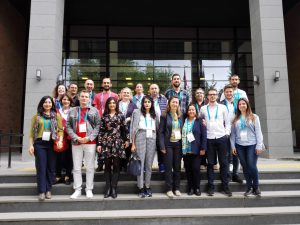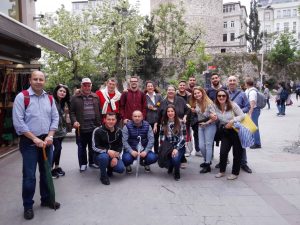Noveno curso del proyecto Erasmus+ We M@ke It H@ppen en Turquía
Desde el día 7 al 11 de mayo de 2018 tuvo lugar el 9º curso del proyecto europeo Erasmus+ We M@ke It H@ppen en Turquía. Los días 7, 8 y 9 de mayo el curso se desarrolló en Gebze, mientras que los días 10 y 11 se llevo a cabo en Eskisehir.
Durante nuestra estancia en Gebze, acudimos al centro escolar de Educación Primaria Mehmet Alp Tiryakioglu, y a los centros escolares de Educación Secundaria Kanuni Social Science School y Koç Secondary School. En ellos, vimos cómo era la educación en Turquía, gracias a los diferentes docentes que nos abrieron las puertas de sus aulas para que observáramos el desarrollo del proceso de enseñanza-aprendizaje que se daba en cada una de ellas. Resultó impactante la cantidad de recursos tecnológicos y educativos que poseían en las aulas, especialmente la pantalla digital e interactiva. A esto hay que sumarle las aulas enfocadas a alguna materia en concreto, cómo era el aula de física, arte, educación física, etc. También señalar el decorado y los recursos elaborados por los docentes y el alumnado que facilitaban el proceso didáctico.
Por otra parte, en Eskisehir acudimos al centro de Educación Secundaria Oguz Anatolian High School, donde aparte de mostrarnos sus instalaciones y explicarnos el funcionamiento de su centro, tuvimos la ocasión de acudir a una clase de Física. En ella, observamos como el docente apoyaba su discurso didáctico en una pantalla digital e interactiva, con la que visualizamos un vídeo sobre las energías, consiguiendo que los discentes vieran de manera más pragmática el contenido que se les explicaba. Posteriormente, el docente terminó la sesión con un juego, donde el alumnado iba contestando con sus móviles a las preguntas que aparecían en dicha pantalla táctil, poniendo en práctica los conocimientos adquiridos. También tuvimos la ocasión de visitar la Anadolu University, que es una de las dos universidades que pertenecen a la ciudad de Eskisehir. Allí, realizamos un workshop sobre la plataforma del proyecto, como también un tour por los diferentes espacios de la universidad dedicados a las nuevas tecnologías.
En comparación con los centros educativos españoles, indicar que en Turquía hay un mayor número de discentes por clase en Educación Primaria (36), mientras que bastante menos en la Educación Secundaria (16), al menos en los centros a los que acudimos. También señalar que el alumnado turco cuenta con mayor libertad dentro de las instalaciones escolares, que se traducía en mayor interés en el desarrollo de las materias. Un dato importante de dicho alumnado es que la mayoría no sabían hablar inglés, así como que tampoco habían viajado fuera de su país, por lo que el interés por conocer a personas que venían de fuera era elevado. Además, señalar la alta motivación que se mostraba en las clases debido al uso de las nuevas tecnologías en las mismas. Por último, destacar la importancia de la política dentro de la escuela, representada a través de carteles, cuadros e imágenes.
Por último, agradecer a los socios de Turquía, Gebze Milli Egitim Mudurlugu y Anadolu University su hospitalidad y a todos los demás socios de Italia, Grecia y Rumanía su colaboración.
Para más información sobre el proyecto puede visitar nuestro blog post del primer meeting del proyecto.
Ninth course of the We M@ke It H@ppen Erasmus+ project in Turkey
From 7th to 11th of May 2018, the 9th course of the Erasmus + European project We M @ ke It H @ ppen took place in Turkey. On 7th, 8th and 9th of May the course was held in Gebze, while the 10th and 11th of May the course took place in Eskisehir.
During our stay in Gebze, we went to the «Mehmet Alp Tiryakioglu» Primary Education school, and to the Secondary School «Kanuni Social Science School» and «Koç Secondary School». There we saw how education was in Turkey, thanks to the different teachers who opened the doors of their classrooms so we could observe the development of the teaching-learning process that took place in each one of them. The amount of technological and educational resources that they have in the classrooms, especially the digital and interactive screen, was impressive. Classrooms environment focused on a particular subject, how was the classroom of physics, art, physical education, etc. Also noticeable was the decoration and the resources elaborated by the teachers and the students that facilitated the didactic process.
On the other hand, in Eskisehir we went to the «Oguz Anatolian High School» Secondary School, where apart from showing us its facilities and explaining the operation of its center, we had the opportunity to attend a Physics class. In it, we observed how the teacher supported his didactic speech on a digital and interactive screen, with which we visualized a video about energies, letting students see in a more pragmatic way the content that was explained to them. Finally the teacher ended the session with a game, where the students were answering with their phones to the questions that appeared on the touch screen, putting into practice the knowledge acquired. We also had the opportunity to visit «Anadolu University», which is one of the two universities that belong to the city of Eskisehir. There, we held a workshop with the project platform, as well as a tour of the different areas of the university dedicated to new technologies.
In comparison with the Spanish educational centers, there is a greater number of students per class in Primary Education in Turkey (36), while much less in Secondary Education (16), at least in the centers to which we went. Turkish students have greater freedom within school facilities, which translated into greater interest in the development of the subjects. An important fact about these students is that most of them did not know how to speak English, they had not traveled outside of their country, so the interest in getting to know people who came from abroad was high. Also, high motivation that was shown in the classes due to the use of new technologies in them. Finally, we’de like to highlight the importance of politics within the school, represented through posters, pictures and images.
Finally, I would like to thank the partners of Turkey, Gebze Milli Egitim Mudurlugu and Anadolu University for their hospitality and all the other partners from Italy, Greece and Romania for their collaboration.
For more information about the project you can visit our blog post of the first project meeting.
Nereida Varela
Latest posts by Nereida Varela (see all)
- ¿Crees que se puede alcanzar la igualdad en el trabajo sin formar a la plantilla? - 25/08/2023
- ¡Nueva oferta de empleo en Marketing en modalidad de teletrabajo! - 02/08/2023
- Inercia Digital recibe el premio “Mujeres Imparables” en la categoría de Innovación // Inercia Digital receives the «Mujeres Imparables» (Unstoppable Women) award in the Innovation category. - 31/03/2023


